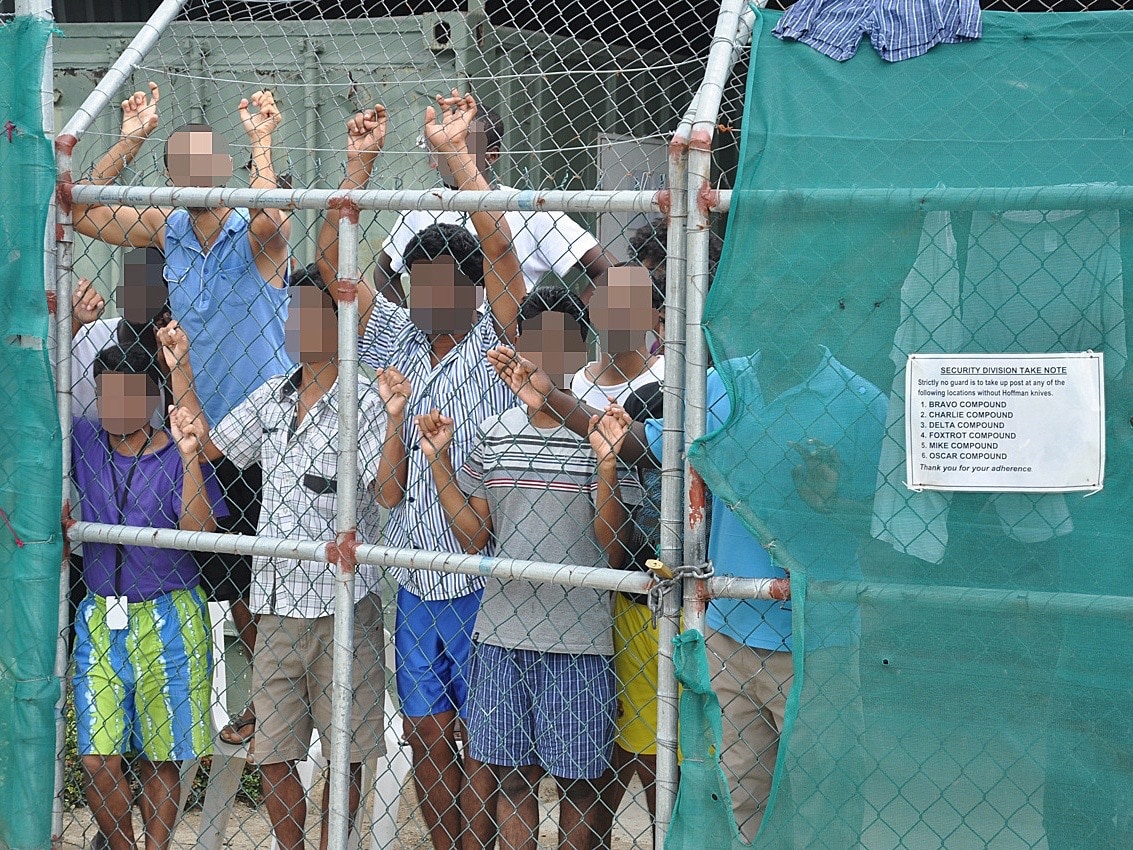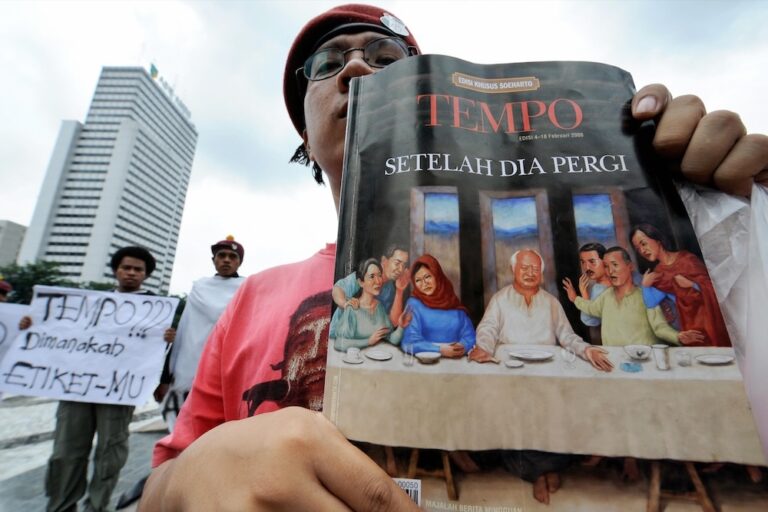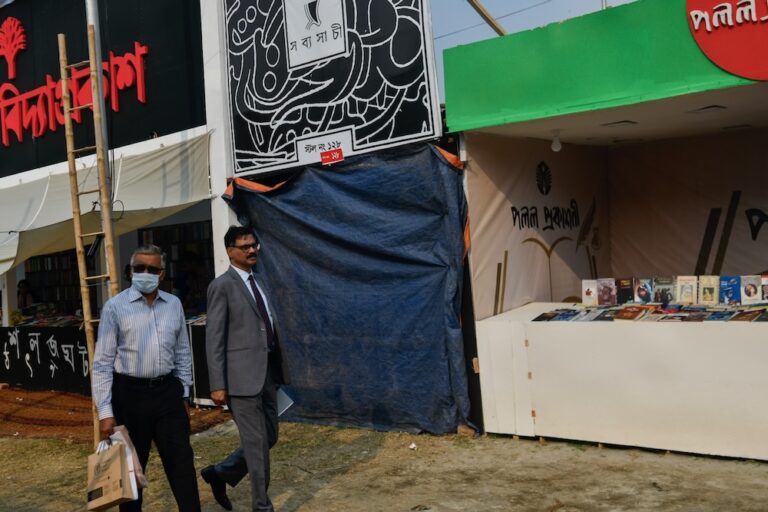Award recognizes Iranian cartoonist held by Australia, surveillance in Thailand takes a most scary turn and a report on transgender women in Cambodia reveals shocking statistics.
Campaign for Iranian cartoonist Eaten Fish
An Iranian refugee battling to be allowed to seek asylum in Australia is this year’s recipient of the Award for Courage in Editorial Cartooning 2016, given out by the Cartoonists Rights Network International (CRNI). Ali, 24, who goes by the pen name, Eaten Fish, has been held at an Australian-funded detention camp in Manus Island in Papua New Guinea for three years. His cartoons document the abuses he has suffered and the appalling state of the detention centres.
In its announcement, CRNI said: “His work pushes through the veil of secrecy and silence and layers of fences in a way that only a talented artist speaking from the inside can.”
The so-called regional processing centres for refugees intending to go to Australia have come under the spotlight for what some in an Al Jazeera story have described as prisons, and where media coverage is restricted.
A global campaign to #SaveEatenFish has been launched to urge the Australian government to move him to Australia, where he can receive medical treatment.
This makes me so sad – #eatenfish is only a couple of years older than my own son, also called Ali #FreeEatenFish https://t.co/NGSvhJK8EP
— Dr M (@helenmerrick) August 28, 2016
Voices exposing rights abuses under attack
In Thailand, a labour rights activist was convicted for criminal defamation and cybercrime for a 2013 report he wrote for a Finnish civil society organisation, Finnwatch, regarding abuses against migrant workers in the fruit canning sector. According to media reports, the charges against British activist Andy Hall were based on accusations in the report of rights violations at a processing plant. Human Rights Watch (HRW) said in a statement that in recent years, Thai government officials and companies have taken action against those who report allegations of human rights violations.
Just days earlier, the UN Summit on Refugees and Migrants had convened to find ways of improving the treatment of the millions currently displaced and living in inhumane conditions. HRW said Hall’s conviction would have a chilling effect on workers’ rights monitoring in Thailand.
HRW’s Sunai Pasuk commented on Thailand’s obligations to international rights standards in this tweet:
#Thailand promise to improve labor practice is undercut by the sentencing of activist Andy Hall to 4 years in jail for reporting abuses. pic.twitter.com/2fmC4TVtpb
— Sunai (@sunaibkk) September 20, 2016
Media blackouts and denial of access to journalists
Journalists covering public protests in several countries have had to risk harassment and attacks by security forces. The International News Safety Institute’s tips on how to cover demonstrations and civil disorder are a useful tool for journalists expecting to face threats while reporting from the field.
In Afghanistan, media personnel from different news outlets were harassed by security personnel while covering protests in the central Bamiyan province, staged during a presidential visit, over a major power transmission line. Human Rights Watch called for action to be taken against those responsible for the attacks against the media and protestors during the 28 and 29 August incidents.
Meanwhile in China, a long standing controversy over land rights in the province of Wukan saw the authorities assaulting and detaining five journalists from Hong Kong-based new outlets, and forcing a BBC team to leave the province. According to the Committee to Protect Journalists, the Chinese authorities have tried to keep news of the protests out of the media.
In Medan, Indonesia, the International Federation of Journalists strongly condemned the alleged attack of three journalists by air force personnel who were involved in a clash with residents, also over disputed land. During the incident, one the journalists was reportedly sexually harassed by one of the officers, while two others physically abused her.
In Pakistan, protesters from the Muttahada Qaumi Movement (MQM) political party turned violent on 22 August, and attacked the offices of Geo News, Samaa and ARY stations in Karachi. According to the Pakistan Press Foundation, the party supporters were said to have acted on the prompting of their chief, Altaf Hussain, over a court ban imposed on the media on his speeches.
In Nepal, the Freedom Forum condemned the attack of a reporter, Raj Kamal Singh, by a local politician from the Nepali Congress party and development committee members for his reports on the misuse of the district budget.
In Hong Kong, journalists working with online news media were not allowed to cover the legislative council (LegCo) vote counting process on 5 September. The elections had seen stronger pro-democracy voices gaining ground, with some media monitors reporting a blackout of the issue by the Chinese media and commentators.
Hong Kong Free Press among digital media denied access to observe vote count https://t.co/RSDVuq2Kmz pic.twitter.com/s8Tmw5FNbo
— Hong Kong Free Press (@HongKongFP) September 4, 2016
#HK #G20 In Hangzhou, no Great Firewall block on internet for foreigners, but HK election day censored on TV. BBC World going to black.
— Carrie Gracie (@BBCCarrie) September 4, 2016
Special reports: Growing culture of intolerance in India, surveillance in Thailand, transgender discrimination in Cambodia
In a report released in September, the Committee to Protect Journalists says that more than half of the 27 journalists killed in India since 1992 reported regularly on corruption and politics. Yet, no conviction has been forthcoming. But it’s not only the media that is experiencing threats. A joint report by PEN International, PEN Canada, and the International Human Rights Program at the University of Toronto’s Faculty of Law, documents the growing culture of intolerance linked to a rising nationalist discourse and becoming more worrying under the leadership of the Prime Minister Narendra Modi.
A Privacy International report on Thailand shows the emergence of social media based surveillance carried out by people’s network of family and friends. On the one hand, individuals are being recruited and empowered by the authorities to report on and denounce fellow citizens who express anti-government sentiments online and over social media. While on the other, “volunteer” people’s groups like the Rubbish Collection Organisation and Social Sanction (SS) target anti-royalist commentators to be charged under the country’s lese majeste laws.
In Cambodia, the Cambodian Center for Human Rights says it found shocking levels of discrimination against transgender women, many who say they have faced multiple levels of abuses either from the authorities, employers, their families or the general public. CCHR notes in its report that the Cambodian government has been eager to promote the country as Lesbian, Gay, Bisexual and Transgender (LGBT) friendly, but that the reality on the ground is much harsher.
“His work pushes through the veil of secrecy and silence and layers of fences in a way that only a talented artist speaking from the inside can.”CRNI commenting on the work of Iranian refugee and cartoonist Eaten Fish.



